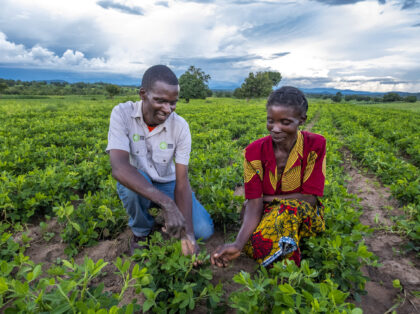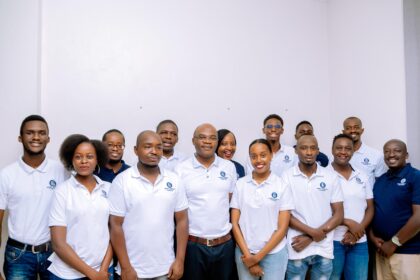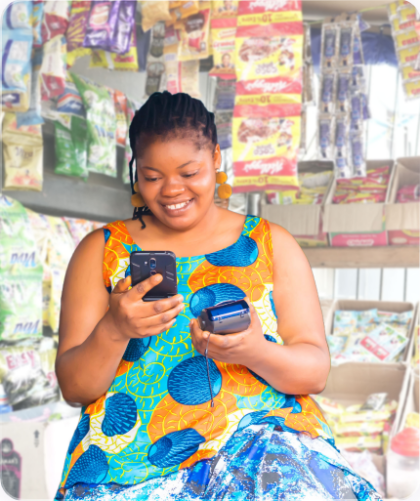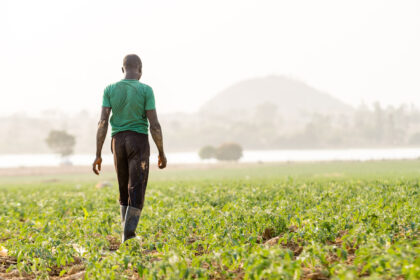
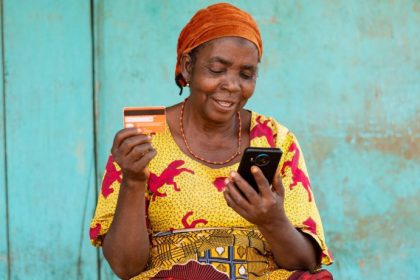
Financial inclusion: Driving economic growth for individuals and underserved communities across Africa
Financial inclusion was the starting point for Goodwell’s approach to impact investing, and remains a key driver for our portfolio and ability to make a positive impact. There are still as many opportunities for improving economic participation as when we started 20+ years ago, and many of them are no longer limited to the financial sector.
For farmers in rural Uganda, making a simple banking transaction can be a daunting task, requiring hours of travel and time off of work. But a better system is emerging – agent banking is now spreading to small villages, allowing people to immediately deposit savings, withdraw cash, and make loan repayments. Bringing financial services closer to home saves time and money while giving people more control over their finances. Goodwell’s investment in the Agent Banking Company of Uganda (ABC) is making the second scenario a reality for more Ugandans: access to convenient, affordable banking is improving their financial outlook and contributing to economic growth throughout the country.
Improving quality of life and climate resilience
ABC is just one example of the how Goodwell works with local entrepreneurs to expand financial inclusion. By connecting underserved communities across Africa to formal financial services, the companies we support stimulate local economic activity, help small businesses grow, provide farmers much-needed access to loans, and enable families to save. This access improves daily lives by creating financial stability and has a ripple effect across entire communities, leading to job creation, increased productivity, and higher household incomes.
The companies we invest in also enable small business owners to start thinking bigger. In West Africa, for example, a small female business owner wanted to expand her business beyond Nigeria, but found that many payment systems were not set up to deal with foreign transactions. Working with Onafriq’s payment solution enabled her to grow, providing seamless cross-border transactions that increase her income and build resilience to local economic or climate-related fluctuations.
And beyond driving economic growth and participation, financial inclusion has become a lifeline for communities grappling with the intensifying impacts of climate change across Africa. Consider a farmer in Zambia who has struggled to farm through prolonged dry spells that left his crops barren. Working with Good Nature Agro (GNA), he diversified his crops and gained access to high-quality seeds and financing. He is now growing drought-resistant crops that are sold at consistent prices, improving both his family’s livelihood and the food security of his village.
Solutions like these show how financial inclusion helps households and small businesses adapt, plan for uncertainties, and bounce back faster.
Generating meaningful social and financial returns
Across sub-Saharan Africa, progress in financial inclusion is clearly evident. In 2022, according to the World Bank, 49% of adults in the region had a financial account, a remarkable leap from just 23% in 2011. This growth signals a transformation in how financial services are reaching the underserved.
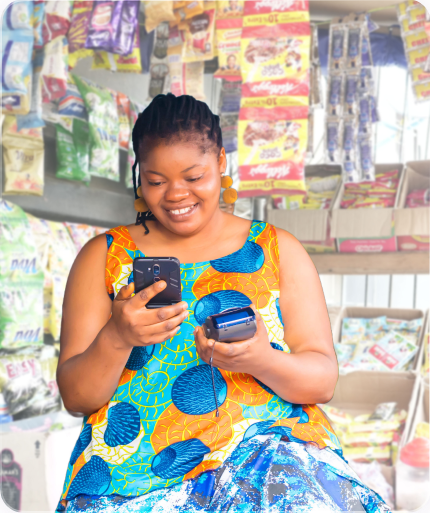
At the heart of this evolution is mobile money, which has grown from a simple electronic wallet into an essential tool for managing financial lives. Today, it enables borrowing, saving and a wide range of payments, from wages and merchant transactions to utility bills. Sub-Saharan Africa leads the global charge, with 28% of adults owning a mobile money account, more than double the global average—making it a significant driver in the region’s financial ecosystem. A few of our investees, including Paga and Onafriq, have been at the forefront of this revolution.
Small- and medium-sized enterprises (SMEs), the backbone of Africa’s economy, are benefiting from innovations that are reshaping access to credit. Digital lenders like Baobab are leveraging alternative data and advanced analytics, breaking down traditional barriers, and providing small businesses with the capital needed to grow and innovate. These advances are fuelling a vibrant SME sector, which in turn drives economic development.
Meanwhile, the rise of insurtech is addressing critical gaps in protection for individuals and businesses. With climate risks and economic uncertainties on the rise, demand for affordable and flexible insurance solutions is growing rapidly. Companies like Inclusivity Solutions are leading the way by integrating insurance with mobile services, offering coverage to those previously excluded from formal safety nets.
In rural areas, hybrid agent-driven models, such as those provided by ABC, combine digital services with existing physical infrastructure to bridge the gap for underserved populations. By blending the convenience of technology with the reach of on-the-ground networks, these models are bringing essential financial services to even the most remote communities, ensuring no one is left behind.
Countless opportunities still exist for improving financial inclusion
Over the past decade, innovations like those mentioned above have shown huge promise across the African continent. But despite these advances, there are still major barriers to financial inclusion – posing a wealth of opportunities for entrepreneurs and investors who can devise scalable solutions that address the realities of underserved communities. The biggest areas for improvement include:
- Infrastructure gaps: Limited financial infrastructure and gaps in digital connectivity hinder access to financial services. In many rural and remote areas, a lack of physical points of service restricts individuals from engaging with formal financial systems. At the same time, low internet penetration makes it difficult for digital financial solutions to reach those most in need. Companies like Paga bridge this divide with digital solutions and a network of 27,000 agents in Nigeria.
- Affordability: For many, the cost of maintaining an account or accessing credit is prohibitive. According to the Global Findex 2021 survey, 59% of unbanked individuals globally report not having enough funds to open an account. Companies like Baobab have make savings and loan services an affordable option for even the most remote communities.
- Lack of credit access: Stringent requirements often lock small businesses out of formal credit systems. Businesses like OmniRetail are addressing this challenge by leveraging technology to enhance access to credit for informal retailers. Its platform can determine the creditworthiness of small retailers and connect them to large financial organisations who are interested in lending to the base of the pyramid.
- Lack of documentation: Many small entrepreneurs and informal workers lack the formal identification or credit history required to access traditional financial services. Digital platforms are starting to bridge this gap, digitising and streamlining onboarding processes to expand financial access and help individuals build financial identities. Companies like MAX integrate financial inclusion with mobility solutions, helping their drivers access credit, insurance, and other essential financial services, creating opportunities for broader economic participation.
- Gender gaps: Financial inclusion should encompass everyone, yet there’s still an urgent need to ensure that financial services and systems better address the needs of female consumers and entrepreneurs. One issue is that traditional credit scoring models fail to accurately assess women’s creditworthiness. According to CGAP, despite evidence that women tend to have better loan repayment rates than men, they frequently face higher barriers to loan approval. This discrepancy suggests that conventional lending models may not fully capture the lower risk profile of female borrowers, inadvertently perpetuating financial exclusion. Goodwell’s gender lens investment approach includes consciously investing in female-led businesses as well as companies that expand financial inclusion for women.
Financial inclusion remains a core focus for Goodwell
With both the impressive progress and remaining challenges in mind, we’re invigorated by the potential of financial inclusion to deliver life-changing impact in Africa. Investing in financial inclusion empowers underserved households to achieve financial stability, enables small businesses to grow and create jobs, and strengthens entire sectors, from agriculture to healthcare, education, and transport.
35% of our current Africa-focused fund, uMunthu II is dedicated to investing in companies that are furthering this goal of financial inclusion. Working with the innovators at ABC, OmniRetail, Max, Inclusivity, Baobab, Paga, Onafriq and more we are increasing financial access, supporting women, and building climate-resilient systems that can help drive sustainable, inclusive growth across Africa. And we’re looking forward to welcoming new financial inclusion pioneers into the fold.
We invite investors and ecosystem partners to join us in our continued efforts to invest in Africa’s immense potential—one entrepreneur, one community, and one investment at a time.
